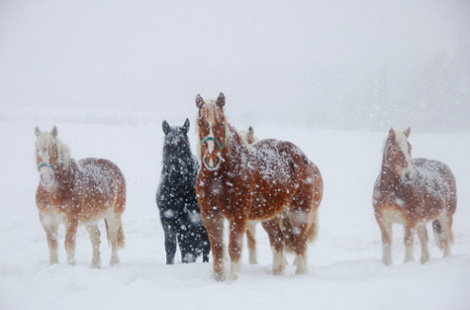CLA - Horses are much better adapted to the cold weather than we give them credit for. They grow an excellent winter coat that insulates them and keeps them warm and dry down to the skin. However, there are some factors to take into consideration when deciding how to manage our horses in the winter. Horses are healthier if given plenty of outdoor time which allows them to adjust to the temperatures and helps them breathe fresh air.
Horses in the fall they put on extra weight so they have fat reserves to burn to keep warm in the winter. This is the reason our domestic horses (dogs, cats and humans, too) always seem to get fat in the fall. In winter the main food available is roughage, dead or dormant grasses and weeds. Roughage, and that includes hay, actually helps warm the horses because it releases heat as it is digested. Have you noticed that your horses eat more hay on very cold days? They are keeping warm. It is good to give them more hay on a cold night, or at least the choice to eat more. But if your horse is in and the barn is closed up and it’s 40 degrees inside, he does not need extra hay. Outside horses with a round bale often do not move much; they leave the round bale only to get water.
The unmelted snow on a horse shows his fur is working by insulating the horse. The horses body heat is not escaping; if his fur did not work the snow would melt immediately.

